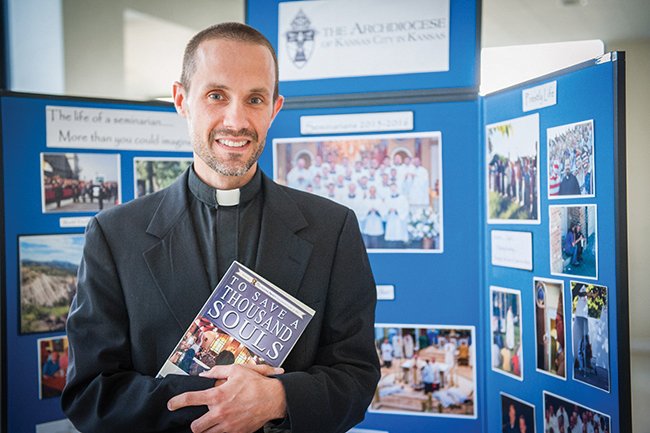
Father Scott Wallisch is the archdiocesan vocations director. You can email him at: frscott@archkck.org.
by Father Scott Wallisch
When Father Mitchel Zimmerman was nearing his ordination to the diaconate, I found myself curious about his seminary formation.
“Do you just practice saying Mass all the time?” I asked. “Actually, we have not had that class yet” came the answer. I was shocked that he had spent four years in the seminary and had not even taken a class on how to celebrate the sacred liturgy. “What in the world are they doing all the time?” I thought. (Oh, how naive I was!)
You might think the same thing. Recently, we sent you a mailer about our annual Easter appeal, Priesthood: Present and Future.
One of the important beneficiaries of your generosity is the seminarian education fund. Our seminarians spend anywhere from five to nine years in the seminary, depending on their age and academic background. That may seem like a long time, until you discover how much formation a priest receives before ordination.
In addition to the academics, there are three other important components of their formation. I thought I would take a few of my columns to explain these four pillars of seminary formation: academic, spiritual, pastoral and human.
To start, we will focus on academics. College seminarians, who work toward a liberal arts degree, and pre-theology seminarians, who already have a degree in another field, both take philosophy classes. They learn the church’s philosophical heritage and then the various philosophies that shape other worldviews.
They also learn Latin, Greek and maybe even Hebrew. This gives them a good foundation for theology studies in major seminary.
The four years of graduate level classes in major seminary form seminarians in the rich theological tradition of the church. There are several classes in each of the various aspects of theology.
Seminarians take courses on Scripture — studying the Gospels and how the Old Testament prepared the way for Jesus, and how the epistles fleshed out his teachings. Seminarians are trained in giving homilies about the Scriptures (which perhaps is what people care about the most).
They are formed in ethics and God’s moral vision for the world. They also study the long, rich history of the church.
Seminarians learn systematic theology, exploring the complexities of the Trinity, the Incarnation, salvation history and the church. They become grounded in canon law, which is the law of the church.
Finally, there are several courses on the sacraments and how they are administered.
A few years after I asked Father Mitchel about his seminary studies, I experienced them firsthand and found they are quite extensive (and just one pillar of formation).
Father Mitchel was right! I did not learn how to celebrate Mass until a couple months before ordination.

